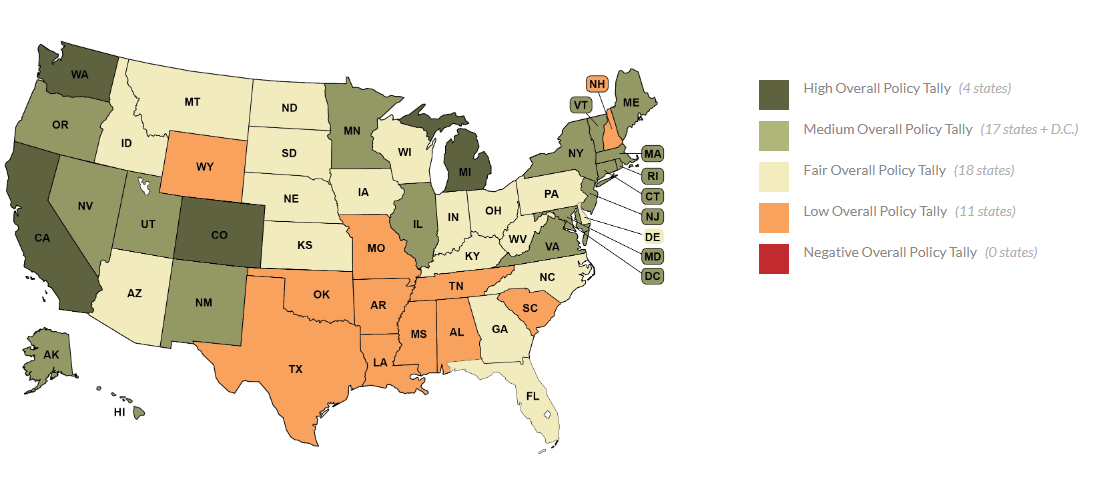By Luisana Rodriguez
While using false claims about voter fraud to undermine public confidence in elections, Republican state legislators have often succeeded in creating new obstacles for Americans to cast ballots. In 2024, voters in 29 states faced at least 63 restrictive voting laws newly enacted since 2020, and the attacks show no sign of letting up.
Yet, despite the understandable attention on these attacks, we also see citizens and legislators working successfully to proactively expand voting access and broaden participation. In September, Michigan’s state senate passed a Voting Rights Act that includes same-day voter registration, increased early voting, and expanded voting-by-mail options. The bill awaits action in the state House of Representatives, where Democrats hold a single-seat majority.
In 2024, Minnesota enacted its own multi-faceted VRA to strengthen voter protection, signed into law by Minnesota Governor Tim Walz and Democratic Party nominee for Vice-president. The Minnesota Rights Act protects ballot access for all residents and specifically aims to protect communities of color and other historically disenfranchised groups.
Additionally, New York, Virginia, California, Oregon, Connecticut, Washington D.C., and Illinois, all recently expanded voter access or protection. A recent report from the Brennan Center for Justice notes these positive steps:
- Virginia: Amplified access to drop boxes and absentee voting for individuals with visual impairments and eligible citizens in jail. New laws allow people with disabilities to vote outside polling places and broaden the criteria for disability eligibility.
- California: For the upcoming elections, California will place drop boxes on state college campuses to encourage student participation.
- Oregon: New requirements mandate translations of voting materials into more languages, ensuring that non-English speakers can access important voting information and understand the process better.
- Connecticut: By offering an extended early voting period, Connecticut aims to improve voter participation and reduce long lines and wait times on Election Day.
- Washington: A new law automatically restores voting rights to individuals with past convictions, even if they are still on parole, allowing more people to participate in the democratic system.
- Illinois: The state has expanded vote-by-mail options to make it easier for residents to cast their ballots from home. Polling place hours have been extended, local jurisdictions can now set up polling places in jails, and central polling locations have been created in each county for added convenience.
Of course, no one should be deprived of voting rights because of the state they reside in, so passing nationwide protections like The Freedom to Vote Act (FTVA) and the John Lewis Voting Rights Advancement Act (VRAA) remains crucial. Throughout U.S. history, underrepresented communities faced tactics designed to repress their voting power, which accelerated since the Supreme Court’s 2013 Shelby County v. Holder ruling, which drastically weakened the Voting Rights Acts (1965) and enabled new state restrictions. Lawmakers passed onerous voter ID laws, voter roll purges, cuts to early voting, and other laws that impede voting and disproportionately affect marginalized groups.

See details on how your state ranks for voting accessibility and what can be improved from the Movement Advancement Project, the source of the map above.
As a Venezuelan immigrant, I cannot vote, but I’m invested in the state of our democracy, especially when it comes to the rights of people of color. I consider protecting the rights of eligible BIPOC voters critical since they are not only voting for their own futures but also for the future of their communities, including those of us who don’t cast a ballot. It’s a shared responsibility that highlights the power of collective advocacy in a democracy.
The strength of this democracy relies on today’s actions—because protecting votes creates a fairer system, where decisions reflect the needs of the diverse populations living within our borders. In Venezuela, the regime of acting President Nicolás Maduro made it almost impossible for citizens living abroad to vote in the 2024 presidential election because most of them opposed his government, one that the United Nations accuses of crimes against humanity.
Despite these barriers, the opposition candidate, Edmundo González, won by a margin of more than two to one. This achievement came from the hard work of dedicated individuals who ensured the ballots were counted and refused to let democracy die, even when the National Electoral Council failed to publish these results and ignored the mandatory transparency required in Venezuelan elections. While Maduro’s regime refuses to give up power, causing social and political conflicts that tear our people apart, the movement led by María Corina Machado continues to work every day to ensure our voices are heard, both at the ballot box and in the streets.
Here in the United States, people are taking crucial steps toward building a more inclusive democracy, where every individual—regardless of background—has a voice. As laws evolve and new challenges emerge, citizens must remain informed, engaged, and proactive in advocating for fair and accessible elections. While it’s now clear no federal voting rights legislation can pass unless a pro-democracy House of Representatives majority emerges from the November elections, we can encourage others in our community to vote, and share news of other state-level successes to remind people that when we work together, we can protect and strengthen our most fundamental rights.
Luisana Rodriguez is a freelance bilingual writer and the co-founder of an affinity group for Latinas in Vermont. She earned her BS in Psychology from Universidad Arturo Michelena in her home country of Venezuela. Luisana has contributed to Business Insider, Reader’s Digest UK, Her Agenda, Latino Leaders Magazine, and Mitú Magazine, among others. Currently, she works in advertising and marketing in Vermont and will soon begin further studies at Champlain College.
